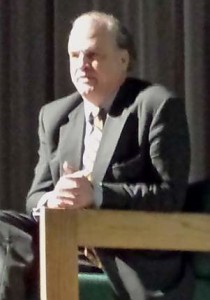 Last Thursday evening Douglas Blackmon, a white man from the South, gave a talk at The Tivoli on the Auraria Campus about his book, "Slavery by Another name". I am writing today to share my recounting of that evening, and a commentary by Norma Johnson, that she wrote after reading my report. We want to share these with you because it was a powerful event with over 300 people attending, and we want to recommend Douglas Blackmon to you (on the internet), his book especially to you, and the continuing Community Conversations series being produced by Facing History and Ourselves.
Last Thursday evening Douglas Blackmon, a white man from the South, gave a talk at The Tivoli on the Auraria Campus about his book, "Slavery by Another name". I am writing today to share my recounting of that evening, and a commentary by Norma Johnson, that she wrote after reading my report. We want to share these with you because it was a powerful event with over 300 people attending, and we want to recommend Douglas Blackmon to you (on the internet), his book especially to you, and the continuing Community Conversations series being produced by Facing History and Ourselves.
Here is my report (John Ferguson) and Norma's commentary follows:
Some of us STRF folks went to see and hear Douglas Blackmon talk last night at the Tivoli on the Aurora Campus. It was a very rewarding event on several counts.
First, the story of his book "Slavery by Another Name" is stark but told in a very revealing way that shows love for the victims. It is the story of perhaps the worst part of Jim Crow. It starts with the loss of concern for freed slaves and their children by National leaders as the century turned from the 19th to the 20th. The newly elected President Taft, a Republican like Lincoln, said in his inaugural address that "it is not the disposition or within the province of the Federal Government to interfere with the regulation by Southern States of their domestic affairs".
In the south at the same time the Jim Crow laws were passed. We hear all the time about the segregation laws. We may not hear so much about the laws that criminalized behaviors that former slaves could commit just by living. Being on the street without a means of support landed you in jail. The evidence was being on the street without money in your pocket, without a job. If you had a job as a field hand, looking for another job was a crime.
These and other pretenses were used to arrest large numbers of folks who were then "rented out" to businesses who had contracts with counties and states to get the labor. Since the Thirteenth Amendment to the United States Constitution abolished slavery and involuntary servitude, except as punishment for a crime, this loophole was used to re-enslave millions of black people.
In 30 years since the war to end slavery, the Northern Republicans had "forgotten" why they fought that war, and the southern Democrats had become the KKK. And as it became once again OK to force servitude on black folks, the white people moved beyond the legal pretensions to the old fashioned idea of kidnapping young men, taking them directly to the work prison factories.
This went on until just before WWII, ended just in time to go and fight the Nazis with a semblance of integrity. The southern culture was one of terrorism against black people. White folks sometimes say slavery ended over a 100 years ago, why can't black people just get over it? Blackmon's book shows, graphically, that slavery didn't end until after I was born. That terror is part of my life, not something of the distant past.
The second gift was the story Blackmon told of his family, his story of how he came to write the book. I can't retell all of it here, but it is his story of growing up in the south with conscientious if racist parents, attending integrated public school while almost all his white peers went to private separatist academies, getting to go to college on a company scholarship that no black peers had access to, and becoming an investigative reporter. Somehow he was blessed to not adopt the culture around him, and instead became a man who could tell us his story of white privilege in an even reporter's way.
The third blessing for us was that we got to pass out about 200 flyers announcing our Second Tuesday Race Forum. Thanks to Wally Barrett, Norma Johnson and Sue Weinstein who helped too, moving through the audience. And thanks to Norma for encouraging me to write this report.
It was a moving evening for all of us. For me it was partially a time of meditation and remembrance of my own family. My white supremacist father grew up in southern Virginia in and around Danville, the son of a tobacco farmer who became a railroad worker and tobacco factory worker. When I was a teen he told me his stories of Jim Crow at our white family dining room table.
He told me of how strong black women were, that they could take a break from picking cotton to deliver a baby, and leave their baby under a tree to go back to picking. He told me how tenant farmers would be forced to buy on credit at the nearby country store, buying seed for the crop and food for the year, and have nothing to show for their crop after settling up (cheated) after harvest.
The part I remember vividly is how he would just shrug and say "that’s just how it is" when I would ask how they could treat people that way. Just shrug and close down his mouth in a strange frown, never able to say, yes, that was wrong. It was joyful for me to listen to Blackmon describe so well the terrorism of Jim Crow and say, yes, it was wrong.
We know that this has not all ended yet. We know that Jim Crow still operates today as the New Jim Crow (so well described by Michelle Alexander in her book "The New Jim Crow / Mass Incarceration in the Age of Colorblindness"), still terrorizing some folks using pretensions of law to lock people up. We know that school segregation is on the rise, using school choice and charter schools to create white separatism, to express white supremacism. We know that our work of the civil rights movement is still going on, continuing to reform the law, and moving beyond legal reform to reform our minds and culture. The Blackmon event was a great event in our effort.
I want to express our thanks to Facing History and Ourselves and the Allstate Foundation for bringing us the event and the opportunity to be a community partner.
Here is Norma Johnson's commentary:
Douglas Blackmon shared some significant aspects of our country’s hidden history as well as sharing so much of himself and his personal story. In addition to John’s commentary, I want to add an observation of my own. One of the very painful consequences of racism is how as a (black) people, we can be seen and treated as so “disposable.” How disturbing it was to hear how black people could not only be legally kidnapped but literally worked to death because there was always a replacement to be had. They were starved, brutalized and subjected to extreme inhumane conditions until many if not most, died from their conditions. Then they were simply replaced with another cheaply acquired human being who had to endure the same treatment.
When a human being can be denounced as an equitable peer and somehow given a cultural status of inferiority, there then can be license to not only discriminate, but abuse, torture and kill based on this premise alone. “Different” becomes synonymous with “bad, undeserving and inferior.” That is how we are able to make war on neighbors and avert our eyes and hearts from mistreatment that is witnessed. Legal and cultural laws are imposed, creating fear, separation and barriers to true human connection.
Being “disposable” is still a consequence of today’s racism. Our black and brown people (youth & adults) are still being incarcerated and disregarded in alarming numbers. Public education, medical care, healthy food and support continues to be inadequate in too many communities of color. Claiming professional empowerment and advancement is still subject to much compliance to white supremacy or we can lose our jobs or be blocked to advancement. And when we cry out to inequities and injustices, there are so many ways we continue to be silenced or punished.
“Disposable” is a sad word indeed when referring to human beings. I thank the organization, Facing History and Ourselves, the Allstate Foundation and Douglas Blackmon for uncovering and sharing our hidden stories in history, for shining light onto the power of human connection and for demonstrating that how we think and perceive today, creates our history tomorrow. It was quite an honor to be at this event and to be a member of our Race Forum supporting this as a community partner. Thanks to all the folks who braved the snow storm to attend!
